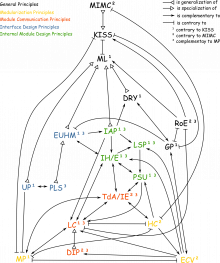This is an old revision of the document!
Table of Contents
Liskov Substitution Principle (LSP)
Variants and Alternative Names
Context
Principle Statement
“Subtypes must be substitutable for their base types.”1)
Description
Object-oriented programming languages allow to derive subtypes from base types and subtype polymorphism allows to pass an object of a subtype where ever an object of the supertype is specified. Suppose P and Q are types (i.e. classes or interfaces) and Q is derived from P (so Q is the subtype and P is the base type or supertype). A method m requiring a parameter of type P can be called with objects of type Q because every object of type Q is also an object of type P. This is always true as typically object-oriented programming languages are constructed in that way.
But the programming language does not enforce that the subtype also behaves like the supertype. Method m may work with an object of type P but not with an object of type Q. LSP demands that a subtype (Q in the example) has to be constructed in a way that it behaves like the supertype if it is called through the supertype interface. Q may have further methods and it may do additional things not observable by m but m shall be able to safely assume that its parameter behaves like an object of type P with respect to all observable state.
Rationale
Let P and Q be types and Q a subtype of P. If LSP is not adhered to, there is an operation accessible through the interface of P which behaves differently when called on Q. So code which is written in terms of P will not expect the behavior and will not work as desired.
Strategies
- Only strengthen invariants in subclasses; never weaken them
- Only waken preconditions when overriding methods
- Only strengthen postconditions when overriding methods
- Use Delegation instead of Inheritance
- Figure out better abstractions
Caveats
See section contrary principles.
Origin
Barbara Liskov: Data abstraction and hierarchy
Evidence
Relations to Other Principles
Generalizations
Specializations
Contrary Principles
- Keep It Simple Stupid (KISS): Not adhering to the LSP can be easier.
Complementary Principles
- Model Principle (MP): MP demands inheritance relations to resemble an “is-a” relationship. This means that an object of the subclass is also an object of the superclass. This is always true in a technical sense as this is how object-oriented programming languages handle inheritance hierarchies. However MP demands that is shall be true in the model, too. This is slightly different from LSP which rather is about a “is-substitutable-for” relationship.
- Principle of Separate Understandability (PSU): When building inheritance hierarchies, LSP constrains how subclasses are constructed. Namely they should comply with the superclass contract. PSU on the other hand demands that the superclass shall be separately understandable, which means that knowledge of concrete subclasses and their needs should not be necessary to understand the superclass. So a superclass should not have a specific functionality, etc. just because a particular subclass needs this. In contrast to that the superclass of course may provide
protectedfeatures for subclasses in general. But it should be inherently clear that subclasses in general may need this functionality without looking at a particular one.
Principle Collections
Examples
Description Status
Further Reading
- Robert C. Martin: Agile Software Development, Principles, Patterns, and Practices, p. 111–125
- Barbara H. Liskov , Jeanette M. Wing: A Behavioral Notion of Subtyping
- Barbara H. Liskov , Jeanette M. Wing: Behavioral Subtyping Using Invariants and Constraints

